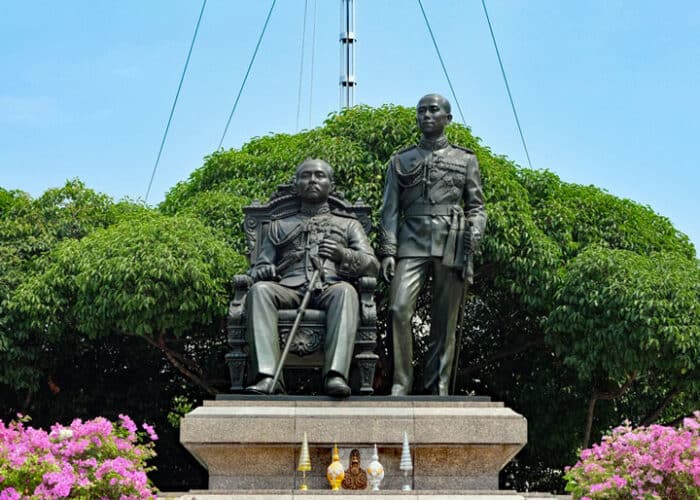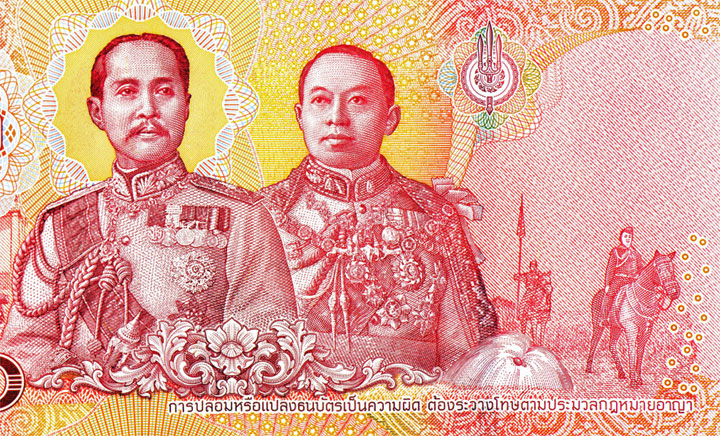The 'Revolution That Never Happened'

King Chulalongkorn and King Vajiravudh at Chulalongkorn University in Bangkok (iFocus / Shutterstock.com)
On June 25, Rob V. paused - and quite rightly - to reflect on the remarkable way in which the current rulers in the Land of Smiles, under pressure from the Possessed Bodies, reactionary forces and revisionist monarchists, believe they should support the 1932 revolution.commemorate'.
This coup, which ended the absolutist monarchy in Siam, was undoubtedly a benchmark in the modern historiography of the country. In my view, the palace revolt of 1912, often referred to as the 'revolt that never happened' describes at least as important but meanwhile even more hidden between the folds of history. Perhaps partly due to the fact that there are many parallels to be drawn between these historical events and the present…
The reason for this failed coup attempt was the eccentric behavior of King Vajiravudh, who had succeeded his father Chulalongkorn on October 23, 1910. Unlike his very popular father, the new king was not very popular. The autocratically reigning young monarch preferred to think of himself as a modern, Edwardian English gentleman and had spent enormous sums on the coronation festivities. His lavish and, above all, lavish lifestyle contrasted sharply with that of his subjects, who struggled to survive.
The so-called Civil List - the enumeration of all resources that the nation made available to the head of state - accounted for more than 15% of the national budget and the king also received a very large stipend of 700.000 baht every year…. Vajiravudh preferred to translate Shakespeare into Thai, stage plays in one of his palaces, or pump huge sums into his private militia, the Wild Tiger Corps. This paramilitary organization was one of his absolute hobbyhorses in which he surrounded himself with handsome young men personally selected by him, dressed in fantasy uniforms designed by him…. It Wild Tiger Corps was founded by Vajiravudh on 1 May 1911 and was initially intended as a ceremonial guard. The fact that the king was friendly with men from the lowest classes and even rewarded some of his favorites with titles of nobility went down very badly with the nobility and the highest echelons of the civil service. The fact that Vajiravudh had explicitly forbidden membership for officers, on the other hand, angered the army.
The Wild Tiger Corps, into which gigantic sums were pumped, quickly became a thorn in the side of the army. Relations between the monarch and the army had already soured since an incident that had taken place in the spring of 1909 between a few soldiers and servants of the then crown prince about a woman. A skirmish ensued and six soldiers were arrested. This rather banal incident came to an end when a furious Vajiravudh asked his father to have these prisoners beaten, but Chulalongkorn had abolished all corporal punishment a few months earlier and therefore rejected the request. Vajiravudh then blackmailed his father by threatening to renounce the crown. After this, the six soldiers were still publicly administered one hundred and fifty strokes…. The incident caused quite a stir in the highest circles of the army and sharpened the already tense relationship with Vajiravudh.

King Chulalongkorn (King Rama V) and King Vajiravudh (King Rama VI)
After his accession to the throne, his headstrong attitude and especially the favoritism he used quickly undermined the authority of the absolute monarchy. It was almost inevitable that this would lead to problems sooner rather than later. When a major wave of austerity measures hit the army, enough was enough for some officers from the lower and middle ranks. If they had to choose between loyalty to the king or loyalty to the nation, they chose the latter. On January 13, 1912, 7 of these officers swore a costly oath to overthrow the king. The leader of these rebels was Captain Khun Thuayhanpitak. They immediately started looking for allies and eventually recruited 91 officers, many of them from the royal guard.
Apart from deposing Vajiravudh, there was not much consensus about their purpose. A large part of the rebels wanted to depose the monarch and replace him with one of his many brothers. Some of the conspirators wanted a constitutional monarchy and full parliamentary democracy. During his interrogations, one of them invariably spoke of the need for thi prahum ratsadon (the assembly of the people). A handful of the bravest went even further and demanded a republic. Coincidence or not, most of these Republicans turned out to have Sino-Thai rock. They were clearly inspired by the successful Xinhai Revolution that had put an end to the Qing dynasty in China a year earlier. Due to their ethnic background, these officers already had few chances to ever be promoted to the highest cadre and were therefore prepared to go far.
The intention was ultimately to Songkran, the Thai New Year celebration, on April 1, 1912, to assassinate the king. Fate had decreed that Captain Yut Khongyu should carry out the execution, but he had a last minute pang of conscience and confessed the plot to the commander of the royal guard on 27 February. He immediately informed Prince Chakrabongse Bhuvanath, the chief of staff of the army, and within 48 hours all the conspirators were arrested without ever taking action. The rebels, instigators of the 'revolution that never happened' were quickly tried by a court-martial. Three of the leaders were sentenced to death for attempted regicide, regicide and high treason but were never executed, 20 others received life sentences and the rest received sentences ranging from 20 to 12 years in prison…
The palace revolution of 1912 was unique in that it was the first revolt against the ruling Chakri dynasty that did not include nobles. In other words, it was the first time that broad layers of the Siamese population had protested against the royal house. Vajiravudh, who leniently pardoned most of the rebels in 1924, attempted a number of reforms in the following years, with varying degrees of success. One of his most important and least controversial decisions was undoubtedly the dissolution of it Wild Tiger Corps. After his death in 1925, he was succeeded by his brother Prajadhipok, who had inherited a huge mountain of debt from his predecessor, which only increased as a result of the global Great Depression. In 1932 a new and much better organized coup ended the absolute monarchy in Siam. The initiators of this coup d'état later openly admitted that they were inspired by the palace revolt of 1912, "de revolution that never happened'...


A clear summary dear Lung Jan. Thank you. Can't think of any additions to it.
Hi Rob,
Oof….!
Wonderful story
I knew about the rebellion of 1912, but the further details you give, Lung Jan, are far from all. A nice complete story.
Power in Siam/Thailand is much more often contested than is generally claimed.
Would history repeat itself? Popular father, less popular son.
Hi Teun,
It is not without reason that I pointed out the particularly striking historical parallels in my introduction… Everyone is free to draw the necessary conclusions from this…
Jan,
I actually misread that sentence in your introduction. Because of the interesting story that followed, that had slipped my mind. It is good that the reader draws the same conclusion afterwards. However?
Well written and informative, thank you for this!
Interesting story with many details unknown to me. However, not very complete. In the first place, King Vajiravudh has indeed made an essential contribution to the modernization of Thai society, such as making education accessible, first for boys but not much later for girls, establishing the first university, named after his father Chulalongkorn, building the first airport as well as many railroads and so on and so forth. In addition, he tried how to democratize society and governance in his experiment called Dusit Thani. This was not appreciated by his environment who wanted to keep all power to themselves.
Vajiravudh was attracted to 'gentlemanly love', to put it euphemistically, at a time when this was not at all accepted, especially in royal circles. First of all, he was put under heavy and prolonged pressure by his mother to marry and produce offspring. Secondly, life was increasingly made impossible for him by the court in a broad sense. Although he was chosen by his father from among his many sons as the most talented to succeed him, he was given less and less room to translate his often good ideas into policy. Ultimately, after 10 years of kingship and some scandals, he married, not the appointed queen, but a concubine of his own choosing. His only child, a daughter, was born a day and a half before his death in 1925. All in all, perhaps an eccentric man, but above all a tragic king. As far as an assessment of Vajiravudh is concerned, some understanding of the time and the complex context seems appropriate.